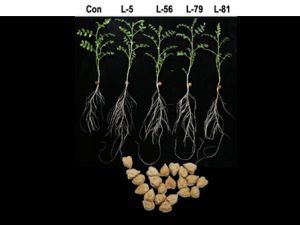Scientists develop new drought tolerant chickpea variety
Scientists have developed a genetically modified chickpea variety that shows high drought tolerance.
India is the highest chickpea producing country in the world. The pulse is a major source of protein for  the people in India. It is grown mainly in semi-arid regions during the post-monsoon season and face drought during flowering leading to huge drops in yield. There is a serious need to develop high-yielding chickpea varieties that can tolerate periodic water-deficit conditions and possess higher seed mineral content for nutritional benefit.
the people in India. It is grown mainly in semi-arid regions during the post-monsoon season and face drought during flowering leading to huge drops in yield. There is a serious need to develop high-yielding chickpea varieties that can tolerate periodic water-deficit conditions and possess higher seed mineral content for nutritional benefit.
A group of scientists fromDepartment of Biotechnology’s New Delhi-based National Institute of Plant Genome Research, University of Hyderabad and Indian Institute of Pulses Research has raised a genetically modified chickpea variety that shows high drought tolerance and high iron and zinc content in seeds by reducing the level of a plant growth substance called cytokininin the root.
Two major plant hormones auxin and cytokinin regulate root development. The researchers expressed a gene for an enzyme called cytokinin oxidase 6 (CKX6) that degrades cytokinin under a root-specific promoter (PWRKY31) in chickpea.
Also Read : Are Small Land Holdings Distressing Indian Agriculture
The gene and the promoter were from chickpea itself. 15-day-old control and transgenic chickpea lines expressing cytokinin oxidase 6 in roots.
The study showed that reduction in cytokinin level resulted in increased root length and branching enabling the plant to acquire water and nutrient from deep in the soil during drought. As the plants were able to acquire more resources from soil, they lived longer and produced more seeds. The genetically modified chickpea lines also showed high iron and zinc in seeds due to low root cytokinin and longer and highly branched roots.
The scientists noted that the study has shown that enhancing the root network by local manipulation of cytokinin level might be an effective approach along with conventional breeding to alleviate yield loss in chickpea and other indeterminate legume crops during drought. The researchers have published a report on their finding in Plant Biotechnology Journal.(India Science Wire)
